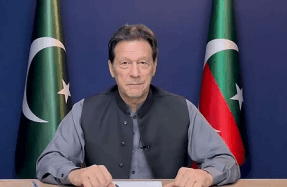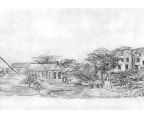In Turkey yet another television show finds itself in hot water
Originally published on Global Voices

Image by Arzu Geybullayeva
Kizil Goncalar (Red Buds) is a new Turkish TV series centered around the lives of Levent (Özcan Deniz), a secular Kemalist doctor, and Meryem (Özgü Namal), a woman deeply rooted in her religious sect. But not only. The show is also about Turkey’s religious cults — a rather sensitive issue in a country where there are some 30 religious communities and sects, according to existing research.
It's not surprising that as a result, after the first episode aired on December 18, the show has found itself in the hot water — outraged. viewers called on producers to cancel the show alongside the show's posters splashed with black paint. Pro-government media accused the show of being Islamaphobic, and most recently, it was announced that filming venue permits for the show’s upcoming episodes will be canceled.
Hedef gösterilmişti
Şişli'de ‘Kızıl Goncalar’ afişine boyalı saldırı!https://t.co/RYNSRAUffq
— Cumhuriyet (@cumhuriyetgzt) December 22, 2023
It was targeted. In Şişli (neighborhood in Istanbul) paint was splashed over Kizil Goncalar's poster.
Radio and Television Supreme Council (RTUK) said it was keeping track of all complaints sent by viewers and that it was reviewing them. The council’s chairman, Ebubekir Sahin, said, “a rigorous scrutiny process is underway for FOX TV [the channel where the show aired].” This isn't the first time a Turkish television channel has faced penalties over a TV series.
One religious sect that has been especially vocal in criticizing the show is the Ismailağa Brotherhood. It is one of the most widespread communities representing the Naqshbandi tradition in Turkey, with well over one hundred thousand members and supporters. According to Turkish newspaper Milliyet, of some 4.5 million people affiliated with the various Naqshbandi communities in Turkey, as many as 7.2 percent are attached to the İsmailağa community […] It is also known as “Çarşamba Cemaati,” referring to its main and sacred Çarşamba neighborhood in the Fatih district of Istanbul. The brotherhood is regarded by the ruling government so much that in June 2022, President Recep Tayyip Erdoğan attended the funeral of the founder of İsmailağa Brotherhood, Mahmut Ustaosmanoğlu, saying he was a man of “knowledge and wisdom of eternity.” The President also shared a video from the funeral via X, formerly known as Twitter.
The brotherhood is especially strict toward women. For instance, it does not allow girls to study and imposes numerous restrictions on women. In 2017, the Brotherhood's television channel blurred images of women wearing no headscarf during a public service announcement by the Ministry of Labor and Social Security. According to reporting by Diken, an online news platform, “There is also a requirement that there should be no female actors in their own productions or in foreign productions. To date, no female face has appeared on the television channel.”
In December 2022, the brotherhood came under the spotlight over a child bride scandal that shook Turkey to the core. The scandal centered around one of the members of the brotherhood, Yusuf Ziya Gümüşel, who was also a founder of a foundation affiliated with the brotherhood, reportedly marring his six-year-old daughter (known only by her initials H.K.G.) to a 29-year-old man 18 years ago. The story was first reported by journalists Timur Soykan and Murat Agirel, who shared evidence that the child was subject to sexual abuse since the age of six. The journalists who broke the case faced a targeted campaign, with some even urging officials to launch an investigation into the reporters and try them in court.
The show reflects some of this as well. In the first episode, one member of the sect calls the headscarved woman teaching at a religious school an “infidel.” The episode also showed how violence against children and child marriage are common.
But the show takes on a dramatic turn as Meryem, who is a child bride herself, battles to prevent her daughter Zeynep from being forced into a marriage with the son of the order’s leader.
Reactions to the show’s criticism were swift. In an op-ed for the newspaper Gazete Duvar, journalist Aylin Dağsalgüler wrote, “If ‘Red Buds’ is going to continue to tell the stories of girls married at a young age, girls who are not sent to school, girls and boys who are abused, if it is going to continue to tell the stories of Maryam and her daughter, what we should be discussing is why these things cannot be prevented in the political atmosphere of the country.”
“These stories [of violence, early marriages] are common in religious families,” said Ayse Cavdar in an interview with DW Turkish. “If those saying that these things are wrong, it means it is perceived as such in their own view as well. Otherwise, why would they not want this to be seen. It is because they know it’s wrong. But they can’t change anything because this is what the hegemony within religion demands,” said Cavdar.
Writer Abdullah Naci wrote on X that he had a hard time understanding the negative reaction to the show. “Friends, religious people just like the secular ones, also eat food, fall in love, sometimes cheat on their spouses, sometimes lie. And that the existence of those who don’t do any of this, does not change the reality nor force script writers to take the latter into account.”
In a recent interview, the series’s producer, Faruk Turgut, said the show reflects on the realities of cults in Turkey. “It is Turkey’s reality. The clash between the seculars and religious people. It is the sociologic reality of Turkey,” said the producer. Meanwhile, the show’s production company, Gold Film, shared a statement via X saying neither the show nor the characters were based on real people or organizations and that it was all fiction. “It is not our intention to target specific groups within the community or denigrate any religion or values.”
“Our aim is to show how on one hand, one group while abusing its value judgments, wreaks havoc, while another group, with different worldviews, finds a common language in life with good intentions at heart. Our series was designed to hold a mirror to the segment of a society that manages to live together despite all their differences.”
In a country deeply divided between secular people and pious Muslims, the show hit a nerve. The question remains whether, this time, a show can make a difference in wider society. Given the reactions, likely not.
Originally published in Global Voices.






